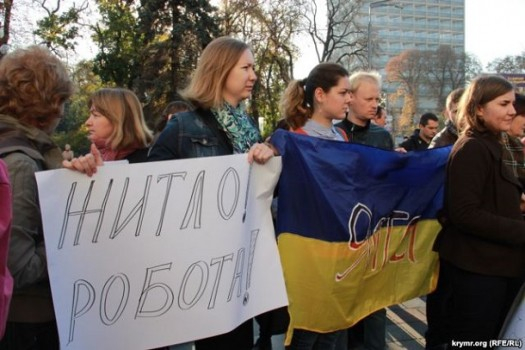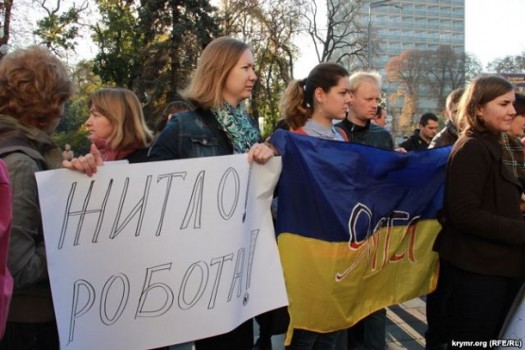
War Fatigue and Peace at Any Price


Over 700 materials concerning the life within the occupied and frontline territories as well as the problems of the IDPs were broadcasted from April to July 2015 in the news of “1+1,” “Inter,” ICTV, 5th Channel, and TRC “Ukraine.” Altogether, it makes 7% of the total amount of the materials; while the part of the items and messages on these problems in the news of “Ukraine” was over 12%, there were hardly 5% of such news at “1+1” and 5th Channel.
The materials covered by these review deal with the problems that are important for both the dwellers of the occupied and frontline territories and the displaced people: the problems with permits and frontline intersection; infrastructure rehabilitation; employment in the occupied zone and at new locations; pension tourism; relations between the adherents of different views; security in the region etc.
The principal trends of the previous review remain: the materials of all the channels are clichéd; the journalists do not scruple to utilize stereotypes and generalizations despite the needs of the audience. These shortcomings may be explained either by their insufficient awareness of the situation or by heavy conditions of work in the frontline zone. One more negative trend still remains: the items of different channels are identical from time to time and contain the syncs of the same people. On the one hand, it reflects the situation of the complicated access to speakers in the conflict zone; on the other hand, it indicates lacking efficiency and quick-wittedness of the journalists. As a result, they regularly violate the standards of balanced thoughts and delivering information completely.
Another problem is the epidemic utilization of the problems and information pretexts concerning the IDPs and the dwellers of the occupied territories for undisguised promotion and political jeansa. For example, “Inter” traditionally presents the problems of the occupied and frontline territories through the comments of the people’s deputies from the “Opposition Bloc” (the representative of which is the co-owner of the channel Serhiy Liovochkin): Natalia Korolevska, Yuriy Boiko etc. “Ukraine,” in turn, has a kind of a daily rubric introducing corporative jeansa of Rinat Akhmetov: messages on the activities of the humanitarian office “Dopomozhemo” (Let’s Help); on providing the occupied and frontline territories with food, paying compensations, providing the sufferers, the displaced people and other vulnerable groups with medical and psychological aid etc. Each material bristles with Donbas dwellers pouring out their thanks to Rinat Akhmetov.
Apart from that, a lot of correspondents of the central TV channels distort information and violate professional standards, thus shaping a false image of a dweller of the occupied or frontline territories or an internally displaced person.
Problems with transportation and permits
During April – July 2015, the permits for crossing the demarcation line were one of the key subjects for discussion. The materials on the difficulties faced by the dwellers of the region who try to leave the occupied zone or to enter it appeared almost every day in the TV news. These materials were generally demonstrating extremely long queues and broadcasting the comments of the civil residents complaining about hours wasted and bribery.
This subject became especially topical in the middle of June, when the system of electronic permits was introduced in order to facilitate the crossing of the demarcation line. Some of the channels simply reported the introduction of a new system, while “Inter” and “Ukraine” severely criticized it.
The same “Inter” and “Ukraine” paid attention to the action at Maidan Nezalezhnosti in Kyiv, during which the IDPs were demanding to facilitate the system of permits, to cancel the prohibition of marketing with the occupied territories and so on.
Nearly all the materials of the central TV channels show how the dwellers of the occupied areas of Donetsk and Luhansk regions leave for the territories under Ukrainian control to buy cheaper food and sometimes even carry contraband goods with them. From time to time, contraband seems to be justified by complicated conditions, if not legalized.
They often underline that Ukrainian military men prohibit the local people to cross the border in unauthorized spots, do not let them pass without permits and carry forbidden things: “Therefore, in order to carry goods, local people resort to tricks. As usual, these are a baby in their hands or a fairy story about a late relative. There are already thousands of such stories here” (ICTV).
Destroyed dwelling houses and infrastructure
The subject of destroyed dwelling houses and infrastructure arises almost in each material on the occupied territories or conflict zone. As a rule, these are the comments of local dwellers regarding destroyed houses, the absence of roads, transport and communications, problems of medical supply and accusing the power authorities of not rehabilitating the region. They often show how Ukrainian military men restore the infrastructure on their own or help the locals to do it. The problem of destroyed infrastructure is sometimes utilized to criticize the power by the deputies of the “Opposition Bloc” at “Inter” and “Ukraine.”
Another frequently mentioned aspect of the problem is broadcasting of the Ukrainian TV channels in frontline and occupied territories. The journalists stress that many local dwellers shape their views under the influence of Russian television. Therefore, the renewal of Ukrainian channels broadcasting is presented as positive news: in particular, at the end of April, “1+1” and 5th Channel announced the reestablishment of the TV tower in Sloviansk.
It seems rational to mention that TV items contain no accurate information, which would be based on social surveys, on the level of support for separatist ideas and the expansion of Russian TV channels and radio stations in frontline and the more so occupied areas of Donetsk and Luhansk regions. The journalists tend to manipulate their biased observations and assumptions and often misrepresent them as facts.
The amount of information on the life in the occupied territories is disproportionally small in the news. Only the channel “Inter” almost daily delivered the information from the occupied areas of Donetsk and Luhansk regions in the rubric “Under occupation” as telephone stories of the dwellers of that places. Most of all, they talked about the shortage of food and medicaments, growing prices, the Russian roubles put into circulation, problems with pensions and so on. In the meantime, comprehensive items on these problems were not many even at “Inter.” For the most part, they report the problems of the rehabilitation of destroyed buildings and idle promises of local officials. What is more, TV channels are not very inventive while looking for their own sources of information in the occupied territories; therefore, not only video, but also information as it is often fails to mount the demarcation line and to get to the news.
It is interesting to note that the meeting in Donetsk, during which the protesters were demanding to cease fire, was reported by all the channels, but with different emphases: “Some of the protesters were shouting “get out of here all of you;” others were calling “PRD” to go over the top and drive away the Ukrainian army” (“1+1”); “People have even blocked the central street of the city. Russian media, in their turn, embraced the opportunity to show the meeting and stated that the people of Donetsk were demanding not to cease fire, but to mount an attack immediately” (“Inter”); “They were chanting “cease the war,” “return our homes,” “our houses are destroyed”” (ICTV); “The protesters demanded to cease the war” (“Ukraine”).
The materials of central TV channels often show how heavy moral living conditions are in the occupation. For the International Day for Protection of Children, “1+1” introduced a special project “Children of War,” while “Inter” shot an item about a boarding school in Amvrosiivka, which is officially inexistent.
Habitation and employment for the IDPs
Only some of the materials deliver information useful for the IDPs: recommendations on how to draw the documents, where to look for assistance and so on. For the most part, they broadcast stories from the IDPs’ lives. About half of the materials on this subject were put on the air of the channel “Ukraine,” being devoted to the assistance the humanitarian office of Rinat Akhmetov provides for the displaced people. The IDPs are shown as being totally dependent on the humanitarian office.
However, the number of the stories of the IDPs who managed to start a new life and reach success is rather small: not more than ten materials for the whole period (“1+1,” “Inter,” “Ukraine,” ICTV). From time to time, they underline that the displaced people manage to get accustomed to a new place due to the assistance of the locals, which is not always expected.
Only few of the materials, including those in the news of “Inter,” demonstrate the opposite situation: when the IDPs are not accepted at a new place, when they are prevented from starting a new business etc. Only few of the journalists report the real problems faced by the IDPs: bureaucratic obstacles; the necessity to constantly prove the pro-Ukrainian views; biased attitude to the “people of Donbas” (“Inter”); problems with employment because of Donetsk or Luhansk registration (“Inter”); lack of habitation (ICTV, “1+1”) etc.
Taking into consideration the beginning of the entrance campaign, the journalists turned to the subject of access to education by both the IDPs and the dwellers of the occupied territories. However, this problem is presented rather superficially. In April, several items were devoted to the opportunities for the dwellers of the occupied territories to pass external independent testing (“1+1,” “Ukraine,” and “Inter”). In June – July, “Inter” and “Ukraine” talked about the students and pupils from Luhansk who had not received the promised Russian diplomas and certificates: instead, they were given the documents of “PRL” allowing them to enter only the local higher education institutions. Apart from that, the journalists of “Inter” discussed not very high results of the EIT passed by the children from the frontline territories because of their poor opportunities to study comprehensively. Nevertheless, the materials of that kind were rather rare.
ICTV, “Ukraine,” “1+1,” and 5th Channel prepared several materials on higher education institutions and research institutions of Donetsk and Luhansk regions which had moved to the territories under Ukrainian control. Still, these materials extremely miss specific information on how the graduates from the occupied and frontline territories should act, what rights and opportunities they are granted by the state and so on.
Employment in the occupied territories
The image of a dweller of the occupied territories has not changed since the previous review: in lots of materials, there is a stress on the absence of principles and unscrupulousness of the Donbas people who are allegedly ready to support any power for a piece of bread (“The elderly ladies of these places swear: if Ukraine pays the pensions, they are the Ukrainians, too” ICTV).
The problems of employment in the occupied regions are scarcely discussed: there are only few notes on how heavy it is to find a job and how insecure traditional occupations like fishing or agriculture are (ICTV). In April, all the central TV channels broadcasted the items on the miners who were striking because their salaries were not paid and on the teachers whose salaries had been withheld since January (“Inter”). Besides, “Inter” and “Ukraine” criticized the decision of the government to temporally restrict the operation of the pact on civil and political rights as well as the European Social Charter in the territories out of Ukrainian control.
The subject of “pension tourism” is appearing by the way in many items, yet specific information on how pensions are paid etc. is often absent. The journalists, in turn, tell about the pensions paid in terms of Russian roubles in the occupied territories and quote the dwellers of the occupied territories who complain that the pensions are withheld by the occupation government.
Relations between pro-Ukrainian and pro-Russian citizens
The previous review testified the concealment of this subject. During April – July, it appeared now and then in the materials of central TV channels. Most of these materials were devoted to the anniversaries of liberation of the communities with the stress on the transformations in the views of the locals. Firstly, there was an item by “1+1” of the 9th of May devoted to the views of the dwellers of Mariupol. The tendentiousness of narration and generalized statement on “vatni” views of the locals resulted in the indignation throughout social networks and vague response of the audience. It provoked the development of the subject by “TSN,” the news service of “1+1.”
In June, “1+1” and ICTV mentioned the transformations in moods of Mariupol again in several materials. Besides, the news of “Ukraine” and “1+1” informed of transformation in moods in the liberated Rubizhne. On “1+1,” there was a material on the anniversary of Lisichansk liberation with a stress on the fact that the locals refused to pray together with the priests of the Ukrainian Orthodox Church of Moscow Patriarchate.
The materials on the anniversary of Sloviansk liberation were broadcasted by all the central TV channels. Some of them were optimistic, with a minimal stress on the problems (ICTV, 5th Channel); others were, on the contrary, focused on the problems: latent separatism and not enough efforts made by the government to rehabilitate the city (“1+1,” “Inter”). “Ukraine” could not help mentioning the key role of Rinat Akhmetov.
The attitude to people who took part in the so-called referendum of “PRD” is not reported in the news at all. There are only few quotations on this subject.
All in all, as it was mentioned above, the journalists form an opinion about the moods of local population and their transformations through the situational conversations with separate citizens who do not refuse to make comments. Therefore, most of their generalizations are false or make up “wishful thinking”, i.e. the statements that are actually just the projection of the journalists’ expectations.
Relations with the military men in the frontline zone
The broadcasters tend to quote the words of gratitude to the Ukrainian military men sounded by the locals; they show the syncs in which the military men say that they help the locals providing them with food and defending the cities, towns, and villages where they are dislocated. The attitude of the population to the militants is not reported at all or it is underlined that the locals do not turn to the separatists for help: “And where are these representatives of “PRD”? I come here, nowhere else to go” (ICTV). However, sometimes the journalists insinuate that the locals allegedly support Ukraine on-camera, while it comes from the subtext that their real position may be different.
Much fewer materials reflect the tension between the local population and the military men: mistrust, informers of the separatists among the locals, rejection of the Ukrainian army etc. most of all these problems are discussed by 5th Channel, “1+1,” and “Inter.”
A number of the materials of “Under Occupation” broadcasted by “Inter” and mentioned above relay an opinion of the people of Donetsk and Luhansk who state that people cooperate with the occupation power for money.
Security in the frontline zone
This subject appears almost every day. Both the military men and the civil residents complain about the mines in the cities and villages of the frontline zone; the broadcasters report the regular operation of the field engineers. TV news regularly report the bombardments, meanwhile stressing that the Ukrainian military men shoot back only in the last resort, trying to keep to the Minsk agreements.
Much less attention is paid to the fact that the locals often take part in the construction of protection facilities; provide them with machines, and land etc. Information of that kind generally appears on the air of 5th Channel and “1+1.” Other materials create an impression that the locals do not take part in the defensive actions, but just lament and complain about the destructions, lack of medicaments, and keep awaiting assistance from military administration.
Conclusions
Television journalists are extremely restricted in selection of the sources of information on the events in the occupied territories, both in Donbas and in the Crimea. With the exemption of the channel “Inter,” they do not turn to the dwellers of these territories for assistance; in the meantime, travelling over the demarcation line is almost impossible for the correspondents of the Ukrainian TV channels. At the same time, even if the journalists report the events and the problems of the free territories, they tend to produce hackneyed and stereotype items with the same syncs and facts received from the official sources. Verifying the official messages via any alternative sources is out of the question at all, while it is just what the professional standards of information journalism demand.
The superficiality of information concerning the frontline zone, the occupied territories, and the lives of the displaced people remains unchanged. The journalists incline to dramatization, whereas their materials lack specific information, which would be useful either for the dwellers of these territories or for the displaced people. For example, it is the data on how to get a passport; how to draw up pensions; how to register children born in the occupied territories and so on. However, it does not prevent “Inter” and “Ukraine” from mentioning these problems by the way in order to criticize the government in force and to provide self-promotion for the “Opposition Bloc.”
A dangerous trend of biased reporting of the IDPs’ problems and the moods of the frontline population remains conspicuous. Almost all the materials broadcasted from the occupied and frontline territories focus on the shortage of food and medicaments (in particular, the term of “humanitarian disaster” is more often used in the items of “Ukraine”), war fatigue, and striving for peace at any price.
The project is implemented with the financial support by Solidarity Fund PL through the Poland-Canada Democracy Support Program.











